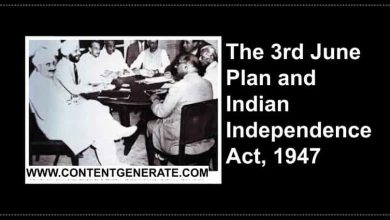
This post discusses the impact of World War II on the Indian subcontinent.
Contents
Background
The Second World War broke out as a result of the German invasion of Poland on September 1, 1939. Great Britain and other European power felt threatened by the German aggression on Poland. This led to the declaration of war by Great Britain and France against Germany on 3rd September 1939. Italy and Japan joined Germany in the war against the allied forces led by the British. The USSR and the USA plunged into the war later on because of German and Japanese attacks on them.
World War II caused immense human loss and economic destruction on a scale history had never witnessed. The war also led to the end of the colonial system, the emergence of a bipolar world, the start of the cold war, and the nuclear arms race, etc.
What was the Impact of World War II on the Indian subcontinent?
The Impact of World War II on the Indian subcontinent was as follows:
There was an immutable impact of World War II on the politics and future of the Indian subcontinent. When war broke out, India was still a colony of Great Britain. Indian National Congress had formed its government at the provincial level after winning votes on both Muslim and non-Muslim seats in the 1937 provincial elections. Though real power rested with the British but formation of government in provinces had given the congress a degree of confidence and opportunity to influence the British in decision making.
From the very beginning, the British had maintained well disciplined and organized troops in India. Over the period of years, these troops had evolved into a strong, well-equipped, and trained army, known as British Indian Army. When First World War broke out, Indian soldiers demonstrated bravery and valor while fighting Germans in parts of Europe and Arabia. With the breakout of the Second World War, the British again wanted to involve Indian troops in the fight against Germany.
1. Congress Resignation from the provincial government
Indian National Congress expected that the British would consult them in any decision regarding the role of Indian troops in the war, whether they should be involved in the war or not. They were ready to support the British in war but in return, they wanted a pledge from the British to leave India after the war.
To the disappointment of Congress, the British did not bother to take congress into confidence and declared Indian troops at war with Germany. This act of the British was resented by Congress. Congress felt offended and resigned from its ministries at the provincial level in protest. Gandhi condemned Nazis, he also declared the British an evil force that had clung to India, by usurping the rights and exploiting the resources of millions of inhabitants of the Indian subcontinent.
2. Demand for a Muslim land by All India Muslim League
Another major political party in India was the All India Muslim League which offered political support in the war with some conditions. The league had linked support in the war with its participation in the government and putting an end to anti-Muslim Congress policies. British did not give any attention to the league as they did not want to further enrage the congress.
As the war progressed, India did not seem to pose any challenge to the British. Till 1942, no major challenge surfaced in India from Congress against the British. All India Muslim League, happy with the resignation of Congress resignation had demanded a separate state Pakistan in its annual session on 23rd March 1940.
3. British conditional promise of independence to India in1942
In 1942, events took a new turn when Japan occupied Burma (Today’s Myanmar) which sent shock waves across allies. The allied forces feared Japan would end up in India as its next destination in the absence of genuine local political support in the war against axis powers.
Thus the need was felt to secure political support from within India in the war before anything untoward happened. Japanese could expedite the politically hostile environment against the British in India. This was how otherwise ignored Congress and the league now caught the attention of the British.
In the face of Japanese annexation of Burma, the British sent Sir Stafford Cripps, a member of the War Cabinet, to India to convince local political forces to support the British in the War efforts in return for a promise of Indian independence after the war.
Cripps Mission failed in its attempt to win local political support in the war efforts. But the conditional offer of independence by the mission also heralded the early British departure from India. Never before, British had talked about the freedom or independence of India. It was not by the free will of the British to offer freedom. This was rather a result of the worst conditions they were in. They have had no better option but to offer the independence to put the Japanese at bay.
When Cripps presented his proposals, Congress rejected them; it rather demanded immediate transfer of powers. Congress knew the British were in a worse situation. It anticipated, with a strong reaction in form of country-wide agitation, the British would easily be compelled to make an early transfer of powers. But British did not surrender to Congress’s demand, it rather signaled to crush any agitation with the use of force.
The Cripps Mission Proposals came at a time when the League had passed Pakitan Resolution 1940. Now, the league would not agree to less than a separate state for Indian Muslims. Jinnah was happy with the proposals giving provinces the right to negotiate their independence after the establishment of a Union of India. Despite that, All India Muslims rejected the proposal saying that the plan does not have any direct reference to Pakistan.
4. Start of Quit India Movement in 1942
Failing in getting its demands accepted, the congress started Quit India Movement in August 1942 asking the British to leave India. Soon there were riots all over India. It seemed as if the British had lost control of India. The British cracked down the movement by force and arresting thousands along with Congress leadership.
The league condemned Quit India Movement. According to Jinnah, the Congress used the movement as a tactic to blackmail the British, in their difficult times, to impose their rule on India. In response to Quit India Movement, Jinnah demanded the British to first divide India into two states and then leave.
5. Grant of independence to India
The British had successfully crushed the agitation and kept a tight grip on India till the end of the war. Nevertheless, they could not hold on to their colonies anymore as the war had left them devastated. They had to rebuild their economy from scratch again. Thus they wanted to leave India and focus on their rebuilding. However, they did not want to leave it in chaos and anarchy. They tried to create a compromise between two major parties, the league and the Congress regarding the future of India.
British failed in their attempts to create reconciliation e.g. Simla Conference 1945, Cabinet Mission 1946, etc. between the league and the congress. This compelled the British to finally announce the partition of India into Pakistan and India on 3rd June 1947. On July 15, 1947, the British parliament passed the Indian Independence Act 1947 to the Partition the Indian subcontinent into two Pakistan and India.
Thus the World War II brought closer the Independence of the Indian Sub-continent. If there were no world war, the independence of India would have further delayed.
Read reviews on Jinnah Speech
Read Major events Before and After Pakistan Resolution 1940




